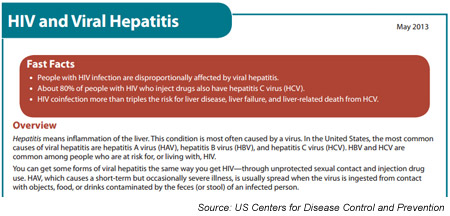The incidence of acute hepatitis C virus (HCV) co-infection has increased in recent years at the largest HIV clinic in Japan, with almost all cases occurring among men who have sex with men, according to a poster presented at the 53rd Interscience Conference on Antimicrobial Agents and Chemotherapy (ICAAC) last month in Denver. For those treated early with pegylated interferon plus ribavirin the cure rate was 80%.
Since the early 2000s, researchers have reported outbreaks of acute HCV infection amongst HIV-positive gay and bisexual men, first in large cities in the UK and continental Europe, followed by Australia and the US. But there have been few reports on acute hepatitis C in East Asia.
Masahiro Ishikane with the National Center for Global Health and Medicine and colleagues conducted a retrospective cohort study looking at people with acute hepatitis C at the AIDS Clinical Center in Tokyo, the largest HIV clinic in Japan.
Acute hepatitis C was defined as alanine transaminase (ALT) elevation >100IU/l accompanied by HCV antibody seroconversion. Acute hepatitis C is often asymptomatic and many people are not aware they are infected. People with HIV typically undergo regular liver enzyme testing to monitor toxicity of antiretroviral drugs, however, and unexpected ALT rises may signal new HCV infection.
The researchers analysed medical records from 34 patients diagnosed with acute hepatitis C between January 2001 and December 2012. All but one were men and the median age was 39 years.
The overall incidence of acute HCV infection was 2.1 cases per 1000 person-years. Incidence increased slightly over time, as shown by a higher rate in the past five years compared with the past seven years (2.6 vs 1.5 per 1000 person-years, respectively).
All but two cases of acute HCV infection (94%) occurred among HIV-positive men who have sex with men (MSM). Most (82%) were on antiretroviral therapy with suppressed HIV viral load and they had a median CD4 cell count of 366 cells/mm3, indicating moderate immune suppression, at the time of HCV diagnosis.
By comparison, this rate is similar to that seen among HIV-positive gay men in the mostly European CASCADE cohort in 1990, before it increased by more than ten-fold in the late 2000s. Rates of 20 to more than 100 cases per 1000 person-years or higher have also been seen in Amsterdam and in the Swiss HIV Cohort. However, a recent analysis of HIV-positive MSM in the US Multicenter AIDS Cohort Study found a rate of only about 5 per 1000 person-years between 2005 and 2011.
Five people (15%) in the Japanese cohort reported a history of injecting drug use, but the route of HCV transmission was classified as 'undetermined' in all cases.
Studies of acute HCV infection among HIV-positive gay men in Europe, Australia and the US point to probable sexual transmission. HCV infection has been associated with various factors in different studies – including fisting, anal intercourse, group sex, use of non-injected recreational drugs and having other sexually transmitted infections – but data have been inconsistent and the exact mechanism of HCV sexual transmission is not fully understood.
Most participants (82%) were asymptomatic and were diagnosed with HCV by chance at a routine clinic visit. Six people experienced symptoms including fatigue (18%) and jaundice, or yellowing of the skin and eyes due to elevated bilirubin (6%). About two-thirds (68%) had HCV genotype 1b, the most common type in Japan, whilst one-quarter had genotypes 2a or 2b.
Five participants (15%) cleared HCV spontaneously without treatment. This group had significantly higher peak bilirubin levels than those who did not naturally clear HCV.
Twelve other patients (35%) started treatment with pegylated interferon plus ribavirin within 48 weeks of HCV diagnosis, with a median interval of four months between initial ALT elevation and starting therapy. The remaining 17 participants (50%) did not receive treatment and progressed to chronic HCV infection.
Hepatitis C treatment lasted a median of 45 weeks (range 11 to 72 weeks). Although only about one-quarter experienced rapid virological response at week 4 of therapy, the 24-week post-treatment sustained virological response (SVR) or cure rate was high, at 80%. This far exceeds the SVR rate seen in most studies of HIV/HCV co-infected patients treated for chronic hepatitis C.
"Early treatment with [pegylated interferon plus ribavirin] should be considered for favourable response in HIV-infected patients with [acute hepatitis C]," the researchers concluded.
Reference
Ishikane M et al. Acute C hepatitis in Japanese HIV-infected patients in this decade. 53rd Interscience Conference on Antimicrobial Agents and Chemotherapy, Denver, abstract H-1268, 2013. View the abstract on the ICAAC website.
This article was first published by NAM/Aidsmap.com (produced in collaboration with hivandhepatitis.com) and is republished with permission.












 打印版本
打印版本
















读者回应
For any information regarding HIV or AIDS,
please contact the offices below.
http://www.hivkensa.com/soudan/index.html#ans11
Sex is gift for LGBT that you must thankful.
But the life had changed.
Our sexual strength now can not be explored free.
it is sad but we have to accept.
But do not be worry, we have to adapt with this situation.
sex can be replaced by taking many activities.
So, you LGBT better to create alot of groups activities, i think.
then you will forget about sex.
The world so wide,
we are brothers-sisters.
lets we create so many group activities.
And reach them that shy.
Because we are love, so simple creation we are.
请先登入再使用此功能。